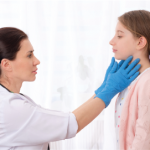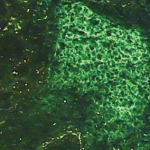Objective & Methods: These researchers conducted a study to investigate whether rituximab, an anti-B cell therapy, improves symptoms of fatigue and oral dryness in patients with primary Sjögren’s syndrome (SS). The multicenter, randomized, double-blind, placebo-controlled, parallel-group trial included a health economic analysis.
Anti-Ro-positive patients with primary SS, symptomatic fatigue and oral dryness were recruited from 25 U.K. rheumatology clinics from August 2011 to January 2014. Patients were centrally randomized to receive either intravenous (IV) placebo (250 ml saline) or IV rituximab (1,000 mg in 250 ml saline) in two courses at weeks 0, 2, 24 and 26, with pre- and postinfusion medication including corticosteroids. The primary endpoint was the proportion of patients achieving a 30% reduction in either fatigue or oral dryness at 48 weeks, as measured by visual analog scale. Other outcomes included salivary and lacrimal flow rates, quality of life, scores on the European League Against Rheumatism (EULAR) Sjögren’s Syndrome Patient Reported Index and EULAR Sjögren’s Syndrome Disease Activity Index, symptoms of ocular and overall dryness, pain, globally assessed disease activity and cost effectiveness.
Results: All 133 patients who were randomized to placebo (n = 66) or rituximab (n = 67) were included in the primary analysis. Among patients with complete data, 21 of 56 placebo-treated patients and 24 of 61 rituximab-treated patients achieved the primary end point. After multiple imputation of missing outcomes, response rates in the placebo and rituximab groups were 36.8% and 39.8%, respectively (adjusted odds ratio 1.13 [95% confidence interval 0.50, 2.55]). There were no significant improvements in any outcome measure except for unstimulated salivary flow. The mean (+/- standard deviation) costs per patient for rituximab and placebo were £10,752 +/- 264.75 and £2,672 +/- 241.71, respectively. Slightly more adverse events (AEs) were reported in total for rituximab, but there was no difference in serious AEs (10 in each group).
Conclusion: Rituximab is neither clinically effective nor cost effective in this patient population. The results of the TRACTISS trial do not support the general use of rituximab in treating primary SS, particularly in patients with recent disease onset and/or low disease activity. Rituximab may still have a role in treating patients with primary SS who have high levels of systemic disease activity and whose disease has failed to improve following conventional immunosuppressive therapy.
Excerpted and adapted from:
Bowman SJ, Everett CC, O’Dwyer JL, et al. Randomized controlled trial of rituximab and cost-effectiveness analysis in treating fatigue and oral dryness in primary Sjögren’s syndrome. Arthritis Rheumatol. 2017 Jun;69(6):1440–1450. doi:10.1002/art.40093


